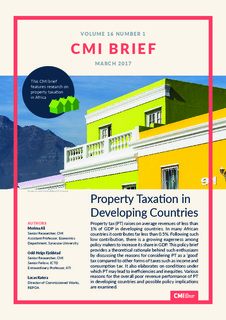| dc.contributor.author | Ali, Merima | |
| dc.contributor.author | Fjeldstad, Odd-Helge | |
| dc.contributor.author | Katera, Lucas | |
| dc.date.accessioned | 2018-01-04T08:23:24Z | |
| dc.date.available | 2018-01-04T08:23:24Z | |
| dc.date.issued | 2017-03-01 | |
| dc.identifier | oai:www.cmi.no:6167 | |
| dc.identifier.citation | Bergen: Chr. Michelsen Institute (CMI Brief vol. 16 no. 1) 4 p. | |
| dc.identifier.issn | 0809-6732 | |
| dc.identifier.uri | http://hdl.handle.net/11250/2475412 | |
| dc.description.abstract | Property tax (PT) raises on average revenues of less than 1% of GDP in developing countries. In many African countries it contributes far less than 0.5%. Following such low contribution, there is a growing eagerness among policy makers to increase its share in GDP. This policy brief provides a theoretical rationale behind such enthusiasm by discussing the reasons for considering PT as a ‘good’ tax compared to other forms of taxes such as income and consumption tax. It also elaborates on conditions under which PT may lead to inefficiencies and inequities. Various reasons for the overall poor revenue performance of PT in developing countries and possible policy implications are examined. | |
| dc.language.iso | eng | |
| dc.publisher | Chr. Michelsen Institute | |
| dc.relation | CMI Brief | |
| dc.relation | 1 | |
| dc.relation.ispartof | CMI Brief | |
| dc.relation.ispartofseries | CMI Brief vol. 16 no. 1 | |
| dc.relation.uri | https://www.cmi.no/publications/6167-property-taxation-in-developing-countries | |
| dc.subject | Tax | |
| dc.subject | Finance | |
| dc.subject | Property Tax | |
| dc.subject | Real Estate | |
| dc.subject | Tanzania | |
| dc.subject | Africa | |
| dc.title | Property Taxation in Developing Countries | |
| dc.type | Report | |
